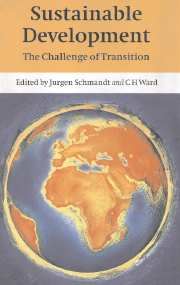Book contents
- Frontmatter
- Contents
- List of contributors
- Foreword
- Preface
- 1 Challenge and response
- 2 National self-interest in the pursuit of sustainable development
- 3 Uneconomic growth: Empty-world versus full-world economics
- 4 Population and consumption: From more to enough
- 5 Spirituality and sustainability
- 6 Leadership skills for sustainable development
- 7 The role of science: Guidance and service
- 8 Economic tools, international trade, and the role of business
- 9 Stakeholders and sustainable development
- 10 From idea to action: The role of policy
- Index
7 - The role of science: Guidance and service
Published online by Cambridge University Press: 17 August 2009
- Frontmatter
- Contents
- List of contributors
- Foreword
- Preface
- 1 Challenge and response
- 2 National self-interest in the pursuit of sustainable development
- 3 Uneconomic growth: Empty-world versus full-world economics
- 4 Population and consumption: From more to enough
- 5 Spirituality and sustainability
- 6 Leadership skills for sustainable development
- 7 The role of science: Guidance and service
- 8 Economic tools, international trade, and the role of business
- 9 Stakeholders and sustainable development
- 10 From idea to action: The role of policy
- Index
Summary
Introduction
One of the most frustrating exercises, even in an article on “sustainability,” is to try too hard to define this beast. The Brundtland Commission (WCED 1987), recognizing that growth “versus” environment was a poor framing of the environment-development debate, popularized the phrase “sustainable development.” Ayres' (1996) attempts to address indices of sustainability provide a perfunctory attempt to summarize some of the literature that defines sustainability:
There has been much academic debate on the exact meaning that should be ascribed to the term “sustainability.” Tietenberg suggests that sustainability means “future generations remain at least as well off as current generations” (Tietenberg 1984, p. 33). In more formal language, the above formulation implies that sustainability means “non-declining utility.” Repetto states, in the same vein, that “current decisions should not impair the prospects for maintaining or improving future living standards” (Repetto 1985, p. 16). The World Commission on Environment and Development suggests, in the same vein, that sustainable development “meets the needs of the present without compromising the ability of future generations to meet their own needs” (WCED 1987). Pearce et al. (1989) and Hoagland and Stavins (1992) have collected a number of other definitions in the literature.
Somewhat cynically, but probably with merit, Ayres concludes:
Apart from being unsatisfactory from the standpoint of reflecting non-economic elements of sustainability, these definitions share another common feature: they are unquantifiable and, absent quantitative measures, unverifiable. Some are sufficiently vague as to permit contradictory conclusions as to whether or not the conditions for sustainability are being met in any particular case. This permits – perhaps, indeed, encourages – perverse interpretations of sustainability to justify continued business-as-usual by business, governments and even the World Bank.
Information
- Type
- Chapter
- Information
- Sustainable DevelopmentThe Challenge of Transition, pp. 131 - 152Publisher: Cambridge University PressPrint publication year: 2000
Accessibility standard: Unknown
Why this information is here
This section outlines the accessibility features of this content - including support for screen readers, full keyboard navigation and high-contrast display options. This may not be relevant for you.Accessibility Information
- 3
- Cited by
